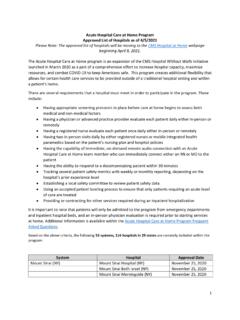Transcription of GUARDIANSHIP OF AN ADULT IN MASSACHUSETTS …
1 1 GUARDIANSHIP OF AN ADULT IN MASSACHUSETTS Prepared by the Mental Health Legal Advisors Committee December 2015 This pamphlet describes MASSACHUSETTS law regarding guardianships of adults only. GUARDIANSHIP generally A GUARDIANSHIP is a relationship where one person (the guardian) is appointed by the court to make decisions for another person. A guardian may be appointed for a minor when the parents are deceased or incapacitated, or for an incapacitated ADULT . The types of decisions a guardian can make depend on the GUARDIANSHIP order. If the GUARDIANSHIP is plenary (also called full or general), the Incapacitated Person no longer has the authority to make decisions about his or her own healthcare, support, education and welfare.
2 A limited GUARDIANSHIP , however, may allow the Incapacitated Person to participate in decision making to the extent they are able. A limited GUARDIANSHIP can be limited to certain decisions, such as medical decisions, or decisions about where the person will live, and the incapacitated person retains decision making power in all other areas not included in the GUARDIANSHIP . Under MASSACHUSETTS law, all GUARDIANSHIP should be limited to the extent The court and physician completing the paperwork for a GUARDIANSHIP must consider limits on the GUARDIANSHIP based on the specific strengths and deficits of the Incapacitated Person to preserve the rights of the Incapacitated Person in specific A guardian must take into account the preferences of the incapacitated person by following the incapacitated person s express values and A guardian must consider the best interests of the incapacitated person when making such decisions because they are a In making the GUARDIANSHIP order the court shall encourage the self-reliance and independence of the incapacitated person while taking into account the person s If the
3 GUARDIANSHIP is ultimately granted, the guardian reports to the court annually about the incapacitated person The authority of a guardian differs from a conservator in that a conservator makes legal decisions about a person s property and financial matters.. Please note that asking the court for a guardian is an important decision. There are less restrictive means that a concerned person thinking of petitioning for GUARDIANSHIP can use to help an incapacitated person. For more information about less restrictive options, please see MHLAC s flier entitled Alternatives to Guardianships and Conservatorships in MASSACHUSETTS . 2 Court process To file for GUARDIANSHIP or to change an existing GUARDIANSHIP order, there are specific forms to use, available at the MASSACHUSETTS Probate and Family Court website: link has useful information about the court process as well as links to other resources.
4 You can ask the court clerk what paperwork you need to file or questions about court procedure. How to obtain a GUARDIANSHIP Either the incapacitated person or a person interested in the incapacitated person s welfare can file a petition for GUARDIANSHIP . The petition is filed in the Probate and Family Court in the county where the incapacitated person lives. To petition for GUARDIANSHIP you need to: file the petition for the court to appoint a guardian; submit a medical certificate or clinical team report with the petition. A clinical team report is used for intellectually disabled people. A medical certificate is used for people with mental illness. A medical certificate must be signed by a physician, psychologist or psychiatric nurse.
5 A clinical team report must be signed by a physician, psychologist and social worker. A medical certificate is valid for 30 days from the date of examination. A clinical team report is valid for six months from the date of examination. Therefore, in some cases the medical certificate or clinical team report will need to be updated between filing and the court hearing. This is to ensure that the medical determination is still accurate. These are the two main documents needed in order to initiate a GUARDIANSHIP hearing. There are other requirements (such as notice and service of process) that you must meet before a hearing is held. When you file the paperwork, the court clerk can tell you about the other requirements. Preparing to defend against a GUARDIANSHIP in court (see also Finding an Attorney, below) Before a GUARDIANSHIP can be put in place over a person, there must be a court hearing.
6 To defend against a GUARDIANSHIP , you can prepare for this hearing in the following ways. 3 Gather evidence to present at hearing that a person does not need a guardian In general you should be sure to present evidence regarding the person s capabilities and ability to make informed decisions. The lists below are not meant to be exhaustive and there are overlaps between the two. For a person with an intellectual disability, gather evidence of: intellectual functioning; training programs completed in money management, basic living skills and sex education etc; activities demonstrating ability to make decisions; employment history; ability to communicate through reading and writing skills; indications of willingness to seek guidance on decisions, and names of people willing to give advice; estimate of potential for growth given more education.
7 For a person with mental illness, gather evidence of: progress in treatment programs; employment history; level of education; support systems in the environment where the person will be or is living including job, school, family, friends, outpatient treatment programs; if institutionalized, access to off-grounds privileges, decreases in supervision, preparation for discharge to less restrictive environment, participation in work or training programs. Have an expert testify at hearing that a person does not need a guardian It is crucial to have an expert testify, such as a psychiatrist, social worker or psychologist. The expert should examine the person and form an opinion on his or her ability to manage personal and financial matters.
8 If the person is indigent, a motion to the court may be made for an independent psychiatrist to examine him or her at the court s expense. Gather evidence to present at hearing about the potential guardian Gather evidence such as: the amount of concern and support the potential guardian provides to the respondent; the availability of the potential guardian; 4 any possible conflicts of interest between the guardian and respondent; any information about hostility or abuse between the potential guardian and respondent. Then, to the extent that this information helps defend against the GUARDIANSHIP , present it at hearing. Consider less restrictive alternatives Consider less restrictive means other than GUARDIANSHIP that may be used to help a person make decisions.
9 If a GUARDIANSHIP order is entered it should be the least restrictive order possible while still meeting the needs of the incapacitated person. See for further information about alternatives. How to change a guardian To change a guardian, there are two or three steps. File a petition for removal OR a petition for resignation in the same court as the original order. o A person other than the guardian would file a petition for removal. o A guardian would file a petition for resignation. On both forms, one can include the name of a proposed new guardian. File a new petition for appointment of a guardian. Possibly file a new medical certificate or clinical team report, depending on the circumstances. How to end a GUARDIANSHIP To end a GUARDIANSHIP for yourself or for another person, you must: File a petition for termination with the same court as the original order.
10 An appropriate medical professional must complete a medical certificate for termination Finding an Attorney When defending against a GUARDIANSHIP The person that the GUARDIANSHIP is being sought for, often called the incapacitated person or respondent, may seek legal representation by: 5 requesting a court-appointed attorney using this form: (also available at the courthouse). Fill out the form and submit it to the court where the petition for GUARDIANSHIP was filed. Any person can submit this form to the court to request an attorney be appointed. (If the court determines that the respondent is not indigent, the court may allow the appointed attorney to collect fees or other compensation from the respondent s estate.)






